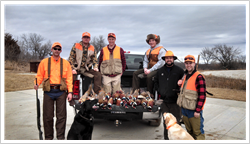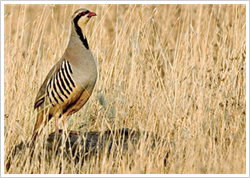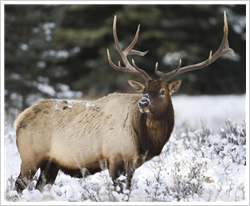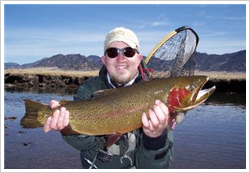Wildlife Violations
Kansas Pheasant Hunting Opener This Weekend


The pheasant season in Kansas opens this weekend and hunters will be out in force. So too, will the Kansas Game Wardens. With many hunters making their annual pilgrimage to the Sunflower State this weekend, opportunities will abound.
A long-held belief among many is the "if it’s not marked with ‘No Hunting’ then it’s perfectly legal to hunt." I myself have heard this throughout my years of pheasant hunting in Kansas and cannot stress enough how untrue it is. I have seen folks receive citations for trespassing when abiding by this age-old bit of falsehood. Always ask permission from landowners. If you can, have a form ready for them to sign that allows you access to their fields for pheasant hunting. NEVER drive, walk, hunt, or shoot birds on property where you don’t have permission to hunt. Keep your dogs and that occasional stray hunting buddy on the right side of the fence.
Often times a combination hunt is warranted in Kansas. With record populations of ducks making their migration through Kansas, you are almost guaranteed to find a good area for duck hunting while walking for pheasants. Remember though, that shooting ducks or geese with lead shots is illegal. If you know you’ll come upon some ducks at the end of a pheasant field, it’s better to not have any lead shot in your possession whatsoever. Pheasants and quail can be harvested with steel, and the ticket is not worth the risk.
Kansas has one of the finest public hunting programs in the nation with its Walk-In Hunting Area program. Pick up or download an atlas that will guide you to numerous CRP, crop, and wetland areas available to the public for hunting. However, if you arrive to a field full of standing crops, remember to not disturb the unharvested crops while hunting. Any areas where this may be an issue will usually have more information available.
As always, you have rights as a hunter and a lawyer with Wildlife Lawyers can help to protect those rights. You should always consult a lawyer before speaking with a wildlife officer outside of the routine license checks. A qualified, Kansas-licensed, Wildlife Lawyer can help make sure a stressful experience with a violation doesn’t ruin a beautiful weekend in the Midwest.
November Brings Multiple Hunting Opportunities/Risks


With Halloween over, thoughts for a lot of folks turn to Thanksgiving and Christmas (if your local store doesn’t already have the garland and plastic trees on display). For hunters and outdoorsmen, November brings several different species into season across the United States and with those increased opportunities, come risks.
Canadian Geese and duck migrations will begin to peak in November and waterfowl enthusiasts will head to the blinds. However, those lucky few that get their limit within a couple of hours may get the opportunity to chase pheasants, quail, and chukars for the rest of the day with most states being in full upland mode by at least mid-November.
A cautionary note from one mixed-bag lover to another: Be extra vigilant about the type of shells you’re carrying into the field. It is much too easy to let a lead pheasant load or two slip into your waterfowl blind bag and mix them up when changing gear in your truck. Possession of lead shot during a waterfowl hunt is illegal and could earn you a violation regardless of your intent to bring it with you.
White-tailed deer and Elk will be in full rut mode very soon and hunters will be in their stands or blinds waiting on a trophy buck or bull. If you have the opportunity to buy an antlerless/doe/cow tag, be sure to mark the tag well so you can see which one you’re putting on that big trophy buck or bull. Take a sharpie and note in the margins what the tag is for, especially if you are the Jack of All Trades hunter who also has archery or muzzleloader tags. Note on the back in big letters what method of take/sex of animal the tag is valid for. It can be easy to grab the wrong tag when the rush of a big rack hitting the ground takes over.
At Wildlife Lawyers, the people we serve are often just regular outdoorsmen who have made a mistake and need help with the judicial process. If you find yourself in a situation, please don’t hesitate to reach out to our qualified attorneys who can be your guide through the rocky terrain of the justice system and give you back your rights. We always enjoy helping other outdoorsmen and women get back in the field, and we do our part to protect their rights.
Elk Violation


November 1st marks the beginning of the third rifle elk season in Colorado. With only four seasons total, the opportunities to harvest a cow or bull are winding down. The third season will run through the 9th of November with the fourth season starting on the 12th and running through the 16th.
While you may feel a certain desperation to fill that tag, it remains crucial to pay attention to what you are doing in the field. Don’t inadvertently stray outside of your designated unit when you’re hot on the trail of trophy bull. Avoid the temptation to "borrow" your hunting partner’s tag or allow him or her to shoot an animal for you and use your tag. Remember to properly tag your harvest and make use of the meat to the best of your ability. The officers with the Division of Wildlife in Colorado know that corners sometimes get cut during the later part of the season and will be out in force.
It is important to remember that as a hunter, even one accused of a hunting violation, you have rights and a Wildlife Lawyer can help make sure you are afforded those rights. Call our offices to speak to a Wildlife Lawyer about questions you may have if you are given a ticket for a hunting violation.
Invasive Species’ Effect on Local Trout


Invasive species are nothing new to hunters. The public has often turned to sportsmen when certain animals move in where they are not supposed to be. Missouri’s response to the increasing wild boar populations has been a policy of "Shoot on Sight," where no matter the season or type of equipment, hunters who see wild pigs are encouraged to harvest as many as possible. When rivers and ponds begin to clog with carp, bowfishing tournaments are a relatively common answer.
Anglers in Colorado are now faced with the arrival of predator fish that are choking populations of trout, as well as other non-game fish in local streams and rivers, as detailed by Scott Willoughby in his recent article in the Denver Post.
A number of endangered fish are at risk of extinction, and while I disagree with Mr. Willoughby about the enthusiasm of outdoorsmen to act to save an endangered species (in friendly discord of course) it is without a doubt the sportsmen who will answer the call to action.
With new regulations concerning certain species of fish that you are likely to encounter on an expedition, it is even more important to double-check the fishing regulations in your area. Game wardens and wildlife officials will take these new rules concerning invasive species very seriously and something as simple as "catch and release" could land you in trouble if you release an invasive species though legally caught.
Kansas Hunters Facing Migratory Bird Violations
It has been hunting season for less than a month and hunters are already making the news in a big way. Four Kansas men were allegedly found in possession of 209 doves, according to KDWPT employees.
Doves are a migratory bird, and if these hunters are convicted or plead guilty to any charges, there could be very serious repercussions. Under the Migratory Bird Treaty Act, the hunters could face federal penalties depending on the route taken by officials in Kansas. Federal judges do not take these kinds of charges lightly and the case will likely attract a lot of attention from hunters, pro- and anti-hunting groups, and legislative authorities through to its conclusion.
When facing these kinds of charges, the advice of a lawyer is crucial in understanding the consequences that go along with accepting any plea bargains from the District Attorney. Judges and prosecutors have little to no say in most states in the administrative repercussions imposed by the Department of Wildlife and Parks, including the suspension of your hunting license or lifetime ban from the sport.
Check back here for a follow-up once the charges being pursued against these individuals are made public.
Article from the Wichita Eagle: http://www.kansas.com/news/local/article1848988.html
Trespassing II
Part II JOE SHOULD HAVE…
What went wrong for Joe and what could he have done differently?
Well you see Joe was from Arizona where the trespass laws are a little different. Down there a landowner has to post his property to keep unwanted persons off his land. Joe didn’t take the time to research Colorado’s laws and just assumed they were similar to Arizona.
Arizona’s trespass law states "reasonable notice prohibiting entry". So if the land is not reasonably posted against entry or trespass you are ok to hunt it. Not so with Colorado, it states in the CRS 18-4-504 "A person commits the crime of third-degree criminal trespass if such person unlawfully enters or remains in or upon premises of another". Colorado law does not require the landowner to either fence or post his land to keep unwanted persons off his land.
Joe could have saved himself a lot of grief if he had either asked for permission to hunt the property in question or had a GPS with maps installed that show when you are on public/private land.
Joe was also taken in by the personable game warden and didn’t think he was under investigation when he was asked to show the location of his kill and afterword when he knew he was under investigation he thought by cooperating his problem would be less severe which in reality is not normally the case.
Joe had the right to ask, when questioned about the kill site by the officer if he was under investigation and at that point should have not answered any more questions. Joe when charged with the above offenses should have been ready to call a good wildlife lawyer rather than to continue to incriminate himself.
Joe’s second big mistake was not using an experienced wildlife lawyer to represent him at the administration hearings which resulted in Joe losing his hunting privileges for five years.
Joe was guilty of trespassing, but a good wildlife attorney more than likely could have negotiated a plea bargain and may have been able to end it at a trespassing charge with no loss of hunting privileges. As a sportsman always be prepared no matter what comes your way.
Trespassing
Trespassing even if done inadvertently can ruin your day. Take the case of an unnamed hunter in Colorado who was hunting in an area of 5-20 acre homes and home sites mixed with a smattering of national forest.
He thought he knew his way around the private land from the forest service map that he had taken along.
The hunter, let’s call him Joe, was quietly still hunting through the semi-open ponderosa pine forest, enjoying the early morning as the sun peaked over the distant mountains. Joe was seeing a lot of signs and was starting to see some does heading for their bedding area. As Joe moved along the low ridgeline hoping to catch a glimpse of one of the big bucks he heard roamed this stretch of woods.
Joe was a little concerned with the lack of fences and terrain features on his forest service map, he was a little unsure of whether or not he was encroaching into private land. But Joe thinking that his ignorance and lack of other people around made it safe for him to continue his hunt.
As Joe crested the ridge he saw a nice 4X4 mule deer buck looking at him. Joe took a knee and fired. Upon approaching the downed buck he could see that he had shot a very nice buck. After dressing the buck Joe made the short drag to the road and while loading the deer into his pickup the game warden pulled up.
The game warden admired Joe’s deer and after a little chit chat he asked Joe to show him where he had killed the buck. Joe took the warden to the spot and the warden marked the "gut pile" on his GPS. The warden then informed Joe that he was on private land and that the landowner had filed a trespass complaint.
Joe’s nightmare was just starting, he was charged with trespassing, illegally taking a deer and ultimately under the "Samson Law" charged with illegally taking a trophy animal. Joe’s fines ended up totaling $22,000 and after a Colorado Parks and Wildlife administration hearing Joe’s hunting privileges were suspended for five years. Joe’s privileges were also suspended in the 37 other states that are members of an interstate compact of which Colorado is a member. See compact http://wildlife.state.co.us/RulesRegs/LawEnforcement/InterstateWildlifeViolatorCompact/Pages/InterstateWildlifeViolatorCompact.aspx
Part II JOE SHOULD HAVE…
Closed Roads
Just a heads up to all sportsmen and outdoor enthusiasts that the National Forest Service is alive and well and working against our interest as forest users. They are in the process of closing roads and camping areas throughout the west.
I was out the other day with a buddy sighting in his new Winchester .22-250 varmint rifle at a place that shooters have been using for years. I’ll admit the place does get trashy from time to time by those slobs that have little or no common sense. But there are those of us that usually take out more than we bring in so all in all it stays pretty clean. But I digress, while we were shooting a guy came walking by exercising his German short hair bird dog and he told us that the road we had used to access the shooting area had been closed. He said we could be facing large fines if we were caught using the road. I had wondered why most everyone had started shooting just up the main road from where we were now, well now I know.
It got me to thinking as a sportsman who uses the national forest a lot, how we as outdoor enthusiasts have been asleep while the forest service just keeps closing roads and making it harder for older people and those with disabilities to enjoy our public lands.
Here’s where I put in a plug for wildlifelawyer.com, keep their phone number in your wallet as it may come in handy if you are ever caught on the wrong road (it is your responsibility to know which roads are closed even if they are not marked) the fines could be stiff and if you are hunting at the time there could be points added against your hunting license. It seems to be a trend with state and federal game and fish agencies to pile on charges whenever possible.
Here in Arizona the forest service has made some peculiar exceptions, if you shoot an elk you can use a closed road or even go off the road altogether with your ATV to retrieve it. That exception doesn’t work for deer, bear, or mountain lion you have to pack these out on your back. Also, woodcutters get a pass, they can drive where ever they like as long as they can demonstrate that there is a dead tree to be cut. Campers are restricted to camping no more than 30 feet off the road in long stretches of open forest roads.
Have you ever been camping off of a forest road when there is a slight breeze blowing from the road toward your campsite? Well if so you know that the dust can be horrendous at times even when you are 100 feet off the road let alone 30 feet. This rule will make it nearly impossible to camp along many miles of forest roads.
It’s time to take a stand and let our voices be heard, it’s important that sportsmen, whenever possible, attend state fish and game and USFS public meetings because without our input they are implementing rules that negatively affect us now and for the future generations of hunters.
First mid-suspension petition for review per H.B. 1330 results in upholding the original suspension
Today, February 8, 2013, the Colorado Parks and Wildlife Commission met and reviewed the first H.B. 1330 Petition to Reinstate Privileges and Welsh Law, LLC was there. HB 1330 relates to "(33-6-106(9), C.R.S.), including, but not limited to, petition submittal procedures, to allow individuals to petition the Commission to end a license suspension [of more than 10 years] under circumstances set forth in statute." Just two commissioners voted "No" which would have allowed some kind of adjustment of the original suspension. More details to follow. Jeffery L. Weeden, Esq.
Colorado House Bill 1330: New Hunter Appeals Process
On April 25, the Colorado House of Representatives passed House Bill 1330. Championed by State Representative Jon Becker, House Bill 1330 would create an appeals process for Colorado hunters and anglers with suspended hunting or fishing licenses.
Specifically, the Bill would give a person with a hunting or fishing license suspension the ability to petition the commission of wildlife to reinstate their privileges. A hunter or angler could petition the commission up to three times after half of their suspension was served if the commission determines that the outdoorsman in question is unlikely to offend again, has maintained a clean record since receiving the suspension, and finally, only if the suspension is their first. In the alternative, if the suspension is a lifetime suspension, a person can only petition after 10 years of the suspension has been served.
If the commission determines that the suspension should be administratively ended, the Bill allows the commission to order a $300.00 maximum fee, 40 hours of service on wildlife projects, or the completion of an educational course to be determined by the Commission.
The Bill could completely change the legal landscape for first-time violators. Prior to this Bill, a hunter or outfitter would face significant administrative penalties without an appropriate recourse. In Mr. Becker’s own words, "[t]his bill gives hunters and anglers in Colorado an avenue for appeal they’ve never had before. House Bill 1330 affords sportsmen a hearing process that will help them pursue their passion for years to come if no wrongdoing can be found."
Not only does this bill give a hunter or angler the ability to continue to hunt or fish in Colorado, but it would also affect his or her rights in other states under the Wildlife Violator Compact. In other words, if a violation occurred in Colorado, the other 35 states could choose to adopt any suspension levied by Colorado. Similarly, if Colorado chooses to reinstate a hunter’s privileges, other states will also likely be forced to consider the same. In fact, states across the board may begin following Colorado’s lead.
House Bill 1330 now moves to the Senate for further consideration.
Stay tuned. We’ll follow this one for you and keep you posted.
Good Hunting.
Cody Doig, Esq.
